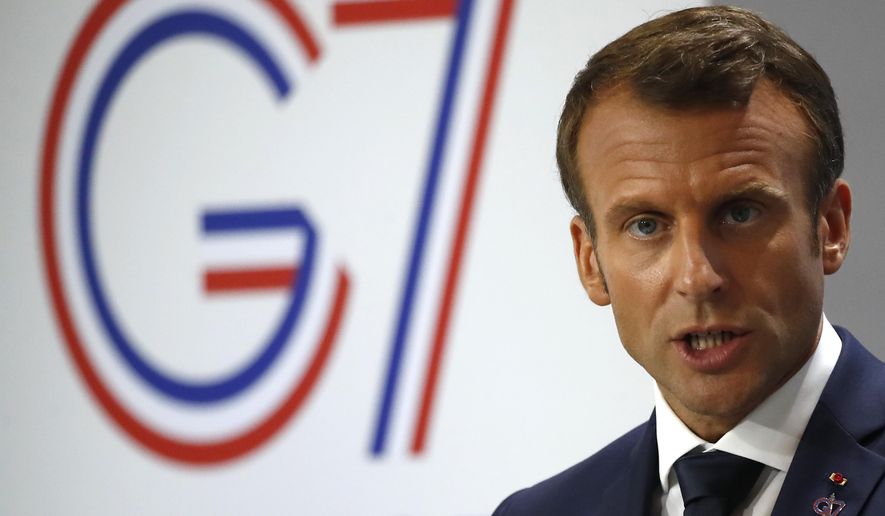BIARRITZ, France (AP) - With clouds growing over growth, French President Emmanuel Macron ended the Group of Seven summit of rich democracies Monday with a sparse declaration in which leaders committed themselves to “open and fair global trade and the stability of the global economy.”
The four-sentence section devoted to trade in the summit’s final statement landed amid uncertainty caused by the U.S.-China trade conflict that has slowed trade among nations and held up industrial production and investment. Macron, who said he wrote the one-page document himself based on positions of the other six leaders including U.S. President Donald Trump, praised the “great unity and the positive spirit of their debates” among the participating leaders.
The statement of professed unity among leaders with 40 percent of global gross domestic product at least presented a contrast to the situation around the closing statement from last year’s G-7 summit in Canada, which U.S. President Donald Trump repudiated on his way to visit North Korea.
Macron said in his closing news conference that “the discussions between China and the US have triggered uncertainty and it troubled investors and markets, creating tensions. We saw it on various stock exchanges.”
“The question is, what will be the outcome of these discussions. We are hoping very much that an agreement is found between the two most important economic powers. President Trump has clearly indicated his will to reach an agreement, and we have seen some positive signals during the last hours of discussions here.”
Yet the politer tone of the 2019 G-7 summit could not hide the fact that Trump and the other leaders critical of his trade policy such as European Union council President Donald Tusk simply agreed to state their positions and leave it at that, reinforcing the assumption that dealing with static from the trade conflict will simply be part of the economy that investors and business executives have to get used to for now.
The statement omitted mention of key economic issues such as whether countries should apply more stimulus from government spending, although some of those were addressed at a finance minister’s meeting in July. Still, the entire statement, including the trade section and paragraphs on Iran and Russia’s conflict with Ukraine, was at 263 words about the same length as the two paragraphs devoted just to trade in the declaration from last year’s summit.
The declaration nods to several of Trump’s issues by calling for “fair” as well as “open” trade and calls for a shakeup of the World Trade Organization so it can better protect intellectual property such as copyrights and patents. That has been a key issue with China shared by Trump and European Union politicians and businesses, who have complained that China requires foreign companies to give up their trade secrets as the price of doing business there. There was no explicit prohibition on trade protectionism, until Trump a commonplace of such declarations.
“So what is bad for world economy is the uncertainty, so the quicker we find and an agreement the more we reduce this uncertainty,” Macron said. “And this was clearly the topic of our discussions yesterday and was also the will of the US president.”
___
Associated Press Writer Angela Charlton contributed to this report.




Please read our comment policy before commenting.